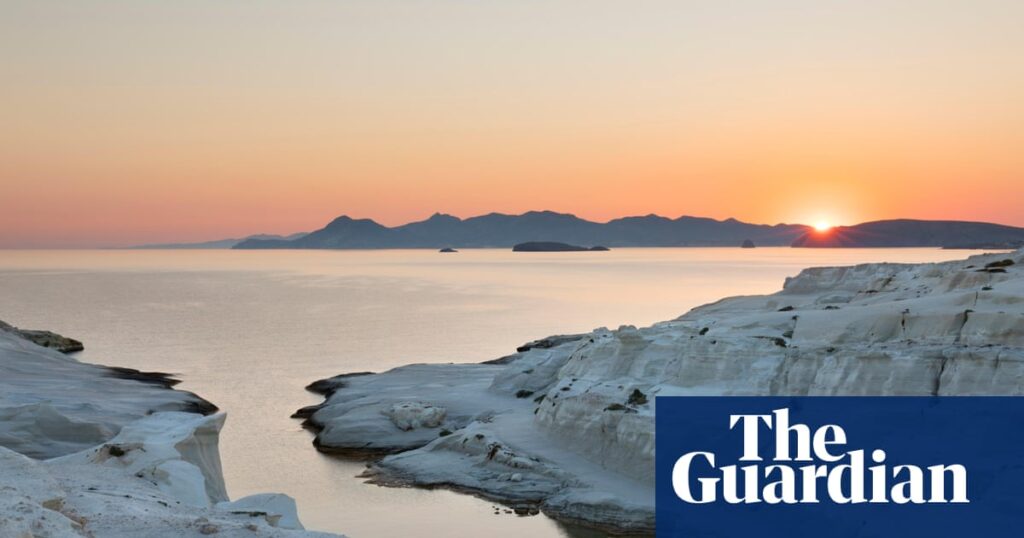
Environmental campaigners have expressed relief following the decision to halt the construction of a controversial five-star hotel on Milos, a Greek island renowned for its natural beauty. The local authorities on Milos announced that the building license for the resort, planned on the island’s famous “moon beach,” has been revoked by the municipality’s planning department due to non-compliance with inspection standards.
The municipal council of Milos stated on Wednesday, “It was found that not all required approvals and supporting documentation had been submitted. No construction will proceed without full compliance with laws and environmental requirements.”
The announcement comes as a response to mounting public opposition faced by Milos’ mayor, Manolis Mikelis, after construction equipment was spotted on the site earlier this year. The beach, known for its lunar-like volcanic landscape, is one of the most photographed shorelines in Greece, described by travel experts as among the most beautiful on the planet.
Environmental and Cultural Concerns
The halted project had envisioned a sprawling hotel complex with swimming pools and cave villas overlooking the turquoise Aegean Sea. However, the development had become a symbol of the threat posed by unchecked construction on Greek islands. Dimitris Vayanos, an academic and head of Save Ios, a citizens’ association dedicated to preserving the Cycladic isle’s character, commented, “The decision is undeniably good news but in reality, it is only a small step in the right direction.”
Vayanos highlighted the pressure from various stakeholders to develop these islands extensively. “Right now, there are about 50 hotels being constructed in Milos,” he noted, underscoring the scale of the issue.
Tourism Boom and Development Pressure
Greece has seen a significant increase in tourism, attracting 36.1 million visitors last year, nearly four times its resident population. This influx has fueled a construction boom, raising concerns about the fragile ecosystems of island chains like the Cyclades. The trend began during Greece’s prolonged economic crisis 15 years ago, with Greek and foreign investors acquiring large tracts of land.
“The Cyclades are especially vulnerable because they are so small,” explained Vayanos, a professor of finance at the London School of Economics. He noted that the crisis in 2010 led to shepherds and farmers selling land to investors, complicating zoning enforcement.
“This whole business started at the beginning of the crisis in 2010 when shepherds and farmers began selling off plots to investors, who in turn began acquiring one plot after another which made [enforcement of] zoning restrictions that much more difficult.”
Environmental Impact and Future Challenges
Runaway construction, particularly of swimming pools, has put unprecedented pressure on natural resources, with water scarcity becoming a significant ecological hazard on Greek islands. In a country on the frontline of climate change, environmental experts have increasingly called for more sustainable tourism practices.
Demetres Karavellas, the general director of WWF Greece, described the Milos decision as “the tip of the iceberg.” He warned that the identity of Greece’s island archipelagoes is at risk if overdevelopment continues unchecked.
“The Milos decision may be a good one … but what happens to the dozens of other similar cases throughout the islands that are not publicly exposed and scrutinised?” Karavellas questioned. “Without proper proactive planning and clear rules, the damage to nature and the very identity of these unique islands is becoming irreversible.”
As grassroots movements gain momentum, landmark victories like the one in Milos are drawing attention. However, campaigners caution that development is progressing rapidly, while the judicial system struggles to keep pace. In 2019, a significant legal ruling was achieved by residents near the Acropolis in Athens, challenging the construction of a towering hotel. Despite the court’s decision to reduce the hotel’s height, the changes have yet to be implemented.
The situation on Milos and other Greek islands underscores the urgent need for comprehensive planning and enforcement to protect the natural and cultural heritage of these cherished landscapes. As the debate over sustainable tourism continues, the Milos case serves as a reminder of the delicate balance between development and preservation.





